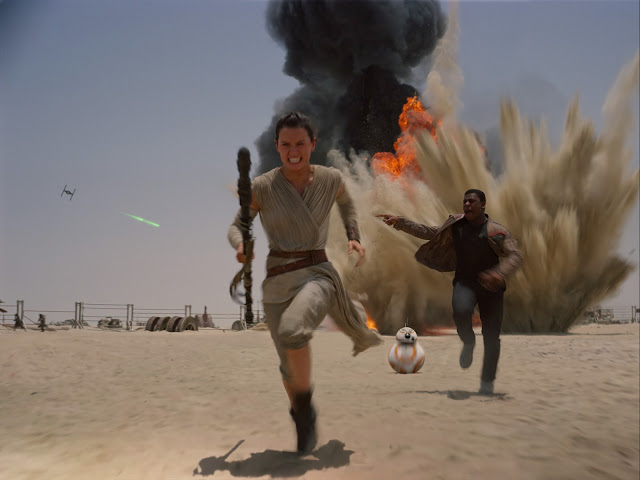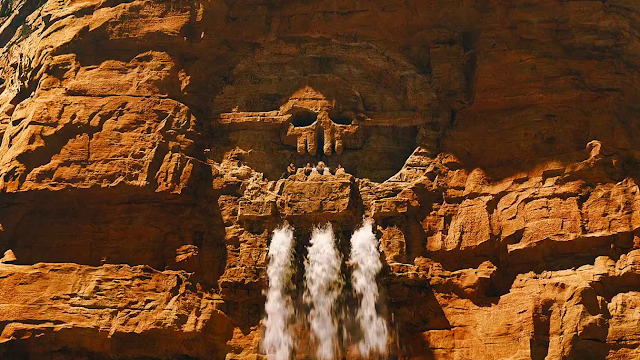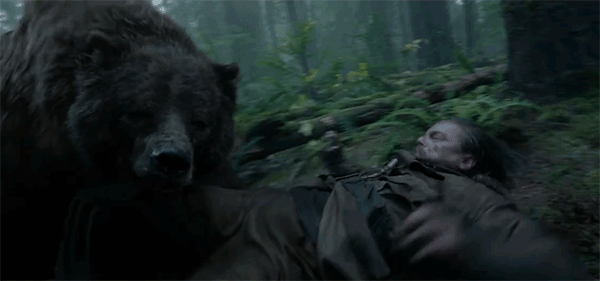Today, the Manifesto is analyzing the technical categories at this year’s Oscars. For our look at the eight “smaller” craft fields, click here. On to the (relatively) sexier categories.
BEST CINEMATOGRAPHY
NOMINEES
Carol—Edward Lachman
The Hateful Eight—Robert Richardson
Mad Max: Fury Road—John Seale
The Revenant—Emmanuel Lubezki
Sicario—Roger Deakins
WILL WIN
The only reason to bet against The Revenant here is the theory that voters are somehow leery of giving Lubezki three straight trophies (after going 0-for-5 to begin his career, he picked up statuettes in 2013 for Gravity and in 2014 for Birdman). That is a poor theory. Sorry, Roger Deakins—maybe next year.
SHOULD WIN
Lubezki is unfair. The other nominees in this category are really good! And then you watch The Revenant, and they all disappear as you are seduced by his fluid camera, which he seems to operate with both barbarity and grace.
THE MANIFESTO’S BALLOT
The Assassin—Lee Ping Bin
Carol—Edward Lachman
It Follows—Mike Gioulakis
The Revenant—Emmanuel Lubezki
Sicario—Roger Deakins
The Assassin doesn’t make a lick of sense, but it’s one of the most gorgeous films I’ve ever seen, imbuing the genre of wuxia with startling pictorial beauty. Carol, with its fine-grained 16mm photography, feels like it belongs in a museum (or it would, if it weren’t so remarkably alive). It Follows amplifies its scares not through cheap shock tactics but through carefully composed frames. Sicario finds the legendary Deakins in peak form, whether he’s shooting a gripping midnight raid entirely in night-vision and infrared or evoking the buried menace of the Southwest’s rolling hills.
The Manifesto’s ideal winner: The Revenant—Emmanuel Lubezki.
BEST FILM EDITING
NOMINEES
The Big Short—Hank Corwin
Mad Max: Fury Road—Margaret Sixel
The Revenant—Stephen Mirrione
Spotlight—Tom McArdle
Star Wars: The Force Awakens—Maryann Brandon, Mary Jo Markey
WILL WIN
So, should we talk about which film is going to win Best Picture? Maybe not. Traditionally, this field was a bellwether for the top prize, but in recent years, it’s more often gone to technically superlative movies than weighty Oscar contenders. (Remember, in 2007, both No Country for Old Men and There Will Be Blood lost this race to a freaking Bourne movie.) So, although the three top candidates for Best Picture are all present here, I’m still going to lean technical and go with Mad Max: Fury Road. The most plausible challenger is The Big Short, as voters may be impressed by its audacious cutting. But in the end, I think the real apocalypse wins out over the financial one here.
SHOULD WIN
The Big Short‘s daring gambit of intercutting from docudrama to actual celebrities addressing the camera is brilliant, but I view it as more of a screenwriting conceit than an editing coup (and frankly, the film’s visual style is too muddled for me to laud its editing). Mad Max: Fury Road flags as it goes on, and The Revenant is just too damn long to win an editing Oscar. Star Wars cross-cuts reasonably well, but it’s more serviceable than extraordinary in that regard. Spotlight at least elevates its sense of stakes through well-timed cutting across its impressive cast, turning a journalistic drama into a nail-biting thriller.
THE MANIFESTO’S IDEAL BALLOT
Bridge of Spies—Michael Kahn
Love & Mercy—Dino Jonsäter
Mission: Impossible—Rogue Nation—Eddie Hamilton
Sicario—Joe Walker
Steve Jobs—Elliot Graham
If Spotlight makes journalistic research exciting, Bridge of Spies makes two old guys chatting in a room absolutely riveting, and the sharp editing is a critical part of that. Both Love & Mercy and Steve Jobs toy with chronology in interesting ways, goosing their biopic narratives with jittery energy. Rogue Nation pops up here for that opera house sequence alone. Sicario absolutely pulses with danger, and every expertly timed cut only enhances its sense of dread.
The Manifesto’s ideal winner: Sicario—Joe Walker.
BEST ORIGINAL SCORE
NOMINEES
Bridge of Spies—Thomas Newman
Carol—Carter Burwell
The Hateful Eight—Ennio Morricone
Sicario—Jóhann Jóhannsson
Star Wars: The Force Awakens—John Williams
WILL WIN
The Hateful Eight. Morricone is an industry legend, and while he received an honorary Oscar nine years ago, he’s never won for a particular score. That ends now.
SHOULD WIN
Flat group. Bridge of Spies‘ music is effective but not especially compelling, and while The Force Awakens features an appropriately rousing score, it hardly compares to Williams’ best work in the franchise. Sicario‘s doomy score is thoroughly unsettling, but it’s also fairly minimalist. The same is true of Morricone’s work on The Hateful Eight; he delivers some stirring melodies, but the chamber drama is just too dialogue-driven for any composer to make a real impact. Thankfully, Carter Burwell’s score for Carol is magnificent, brilliantly heightening the movie’s emotion without ever calling attention to itself.
THE MANIFESTO’S BALLOT
Brooklyn—Michael Brook
Carol—Carter Burwell
Far from the Madding Crowd—Craig Armstrong
It Follows—Disasterpeace
Z for Zachariah—Heather McIntosh
Brooklyn‘s music is tender, delicate, and soulful—precisely what the film requires. Armstrong deftly encapsulates the period setting of Far from the Madding Crowd without drowning it in syrup. It Follows is similar to Sicario, only its terrifying score is far more present. And McIntosh’s work on Z for Zachariah is just plain gorgeous, setting a beautifully muted tone for the film’s quiet melodrama.
The Manifesto’s ideal winner: Z for Zachariah—Heather McIntosh.
BEST PRODUCTION DESIGN
NOMINEES
Bridge of Spies
The Danish Girl
Mad Max: Fury Road
The Martian
The Revenant
WILL WIN
Mad Max: Fury Road. Move along.
SHOULD WIN
Ibid.
THE MANIFESTO’S IDEAL BALLOT
Cinderella
Crimson Peak
Ex Machina
Jupiter Ascending
Mad Max: Fury Road
Cinderella received a nomination for its costumes but not its production design, which is rather odd, given that the two complement each other wonderfully. I’m still having nightmares about the castle in Crimson Peak. Ex Machina turns a sprawling mansion into a subterranean lair. Jupiter Ascending has its problems, but its environments are spectacular. And while I’ve insisted repeatedly that Mad Max: Fury Road, while entertaining, is thoroughly overrated, its production design truly is amazing, as though George Miller and his crew somehow stumbled into a long-lost world, shiny and chrome.
The Manifesto’s ideal winner: Mad Max: Fury Road.
BEST VISUAL EFFECTS
NOMINEES
Ex Machina
Mad Max: Fury Road
The Martian
The Revenant
Star Wars: The Force Awakens
WILL WIN
This is where things get dicey. We can cross off Ex Machina and The Martian, but the remaining three are all serious contenders. Part of this becomes a question of just how voters define this category. Are they looking for digital wizardry (Star Wars, The Revenant) or practical ingenuity (Mad Max)? Do they want loud and flashy (Star Wars, Mad Max) or subtle and deceptive (The Revenant)? It’s impossible to tell, but Star Wars won at the BAFTAs, and it relies so heavily on its effects work that I think the Academy leans its way. But this one is a real question mark.
SHOULD WIN
I tend to prefer the illusive to the demonstrative in this category. That means my two favorite nominees are The Revenant and Ex Machina. I’m tempted to pick the latter, because Alicia Vikander’s character is essentially a walking digital effect. But, well, then there’s this:
THE MANIFESTO’S IDEAL BALLOT
Chappie
Ex Machina
Jupiter Ascending
The Revenant
The Walk
Chappie was junk, but Chappie himself is an awfully impressive CGI creation. Jupiter Ascending takes flight when its characters do the same, allowing the Wachowskis to flex their technical muscle. The Walk is a staggering visual achievement, turning a high-wire stunt into a soaring display of artistic virtuosity.
The Manifesto’s ideal winner: The Walk.
That’s a wrap on the technical categories. We’ll be back tomorrow with posts on the screenplay fields and the supporting actor and actress races.
Jeremy Beck is the editor-in-chief of MovieManifesto. He watches more movies and television than he probably should.



